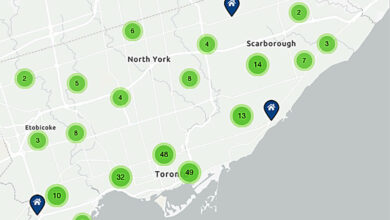
Challenging times – How to get through a pandemic?
Changes to the daily routines, implementing new sales techniques, waiting for a container of materials that has been delayed for weeks, dealing with exponential increases in commodity prices, and political decisions that are sometimes more complicated than helpful… All of this while being careful not to damage customer relationships that have taken years to build—these are the great challenges of entrepreneurs like Edgar Gabriel, from New Canadians Lumber, during this pandemic. In this interview, it is clear that these last few months have challenged the ability of companies to adapt—both management and employees.
Milénio Stadium: The pandemic has brought about substantial changes in the way companies work. What major changes did New Canadian Lumber make to adapt?
Edgar Gabriel: This year has been a year of challenges to say the least. And being relatively small has it’s advantages… Being able to modify and adapt quickly is the key. We did not have to go through levels of hierarchy unlike the corporate Box Stores.
At the beginning of the pandemic Hardware Stores were deemed an essential service and we were allowed to remain open, but customers were not allowed in the store. This is where having an outdoor lumber yard had its advantages over Box Stores. We set up a tent outside in our parking lot. We took phone and walk-in orders and did all our transactions outside. The average wait time was 20 minutes for your material – In comparison it took four days if you went to Home Depot on-line. Customers who bought lumber, after paying, would drive through our lumber yard, while our staff loaded their material into the customer vehicle, all while the customer remained inside his/her vehicle.
But this way of doing business took a toll on our employees… On average employees were walking over 30000 steps in a day: Obtaining the order outside from the customer, walk through the store gathering the items, print the invoice, bring the items to the customer and obtain payment in the outside tent. This lasted five weeks.
Once the government of Ontario allowed customers in our stores, our carpenter shop was quick to build Plexi-Glass Shields up though out our counters: Cashiers / Paint Department / Tile Department and Sales Desk all had Plexi-Glass. I have a feeling these Plexi-Glass walls are here to stay for a long while… It’s a good thing our carpenter, Mario, did a good job making them look good. Today if you enter our store you will be greeted by a staff member who will sanitize your hands and offer you a mask if you don’t have one.
We were lucky that majority of our staff chose to work during the beginning stages of the pandemic; however, we were still missing staff and finding new staff has always been a challenge. Today almost everyone is back and we are fortunate not to have any employee test positive with Covid-19.
Every two hours we call over the intercom system, “Code Clean”. This reminds our staff to clean all the counters, doors, keyboards, phones, etc. – a tedious task; we’ve been doing it so long now that it has become habit.
Prior to the pandemic we were open 7 days a week and closed at 7pm. In March we decided to close Sundays and close an hour early at 6pm. To this day we have decided to keep this schedule. Having the Sunday off makes scheduling easier for our employees and gives them a much-needed rest. I’m not sure if we will ever be open on Sunday’s again. Majority of our clients are contractors who don’t shop on the weekends, keeping our store open on Sunday for minor purchases may not be cost effective, but I understand it is frustrating to local DYI (Do It Yourself) who live in the neighborhood… Something I will have to consider; but for now our employees are enjoying the Sunday off.
Finding drivers has always been a challenge in our industry. Prior to Covid-19 our delivery schedule was from Monday to Saturday. As of March we stopped doing deliveries on Saturday. This also made scheduling for our drivers easier. Now they all work Monday to Friday with the weekend off. Hopefully this easier schedule will help us hire new drivers… We are currently hiring drivers with DZ license.
MS: Another difficulty that arose with the pandemic has to do with the import of material. Does New Canadian Lumber feel that reality in their daily lives?
EG: Unfortunately, there is no manufacturing of tiles in Canada. At New Canadians we import Porcelain Tiles from Portugal, Spain, Brazil and China. And we import our own custom bathroom vanities from China.
In March, April and May placing orders with any factory was next to impossible as most flooring factories across the globe was deem non-essential. Once things came back on line, getting the transportation to ship the goods was challenging and what typically takes four weeks to receive a container from Portugal now took 10 weeks. This occurred due to a lack of available ships.
If one of your containers is unlucky and randomly chosen for inspection by Canadian Customs then your container would be further delayed by three weeks with heavy storage and inspection fees, further raising the cost of shipping material. Due to Covid-19 Canada Customs will store your container for 15 days prior to opening and inspecting.
Also dealing with China has had some challenges… Ever since Hong Kong and China conflict, some Off-Shore companies manufacturing in China had some difficulties switching Electronic Payments to different banking institutions. This extra paper routing may have caused Red Flags with Canada Customs thus increasing the chances of your container being inspected…. This is just a theory of mine.
Home Hardware, our parent company, has warehouses in China stocking a variety of hardware related items for shipment to Canada: hand tools, power tools, fasteners, toilets, sinks, lights, the list is endless. With everyone staying at home and with no vacations abroad in the foreseeable future, renovating the home has become a popular theme. No one anticipated this increase in demand and supply quickly diminished; and yes there were many items that caused our shelves to be empty. Prior to the pandemic we were scheduled to have two shipments a week from Home Hardware. This shipment has been reduced to one shipment a week. Keeping our shelves stocked with a Just in Time based inventory approach is very difficult… We had to increase our orders to hopefully last to the next shipment. This makes it difficult to manage the right amount of stock to carry, thus reducing our efficiency and increasing our inventory carrying costs. Customers have come to realize this as the new norm of having empty shelves.
Unusual things that were in demand and short supply:
- Chicken Wire (due to backyard vegetable gardens)
- Seeds (for your vegetable garden)
- Spray Paint
- Canning items
- Soda Stream (to make carbonated drinks)
- Garden Hoses and Tools
- Sanding Disks and paper
- Plexi-Glass (supply is better now)
- Masks, Wipes, Hand Sanitizer at the beginning… but now is readily available.
We now have a large section of Personal Protection Equipment (PPE). We have a variety of masks for sale, even some with the Portuguese Flag. We are selling touchless thermometers, wipes, coveralls, and hand sanitizer… all products we didn’t sell before.
MS: Bearing in mind that globally, materials are undergoing a great price increase, do you feel that this is affecting your business and, consequently, your customers?
EG: Shortage Pressure Treated (PT) Lumber is a big part of our business but we have had virtually no stock in the last few months. Typically, we have four full trailer loads of PT Lumber delivered a week during the months of May to October. We are lucky to have a ½ a truck load delivered every two weeks our yard. This is significantly impacting our sales… How can a lumber yard survive without lumber?
The shortage of PT Lumber and Cedar was caused by the perfect storm of events:
- Mountain Pine Beetle
- BC Fires – Less trees and road closures to mills.
- Lumber Mills shutting down during Pandemic – assumed demand would be low (they were wrong).
- Truck Driver Shortage
- PT Treaters and Cedar Suppliers never expected an increase in demand due to Covid-19 (in fact they anticipated the reverse and reduced production Jan and Feb).
- Despite the US Soft Wood Tariffs – the US has been importing Canadian Lumber, further driving the price.
- And now hurricanes in the US… Increase demand for plywood.
- With Travel Bands and no foreseeable vacation outside of home – home renovations boomed… in particular people wanted to upgrade their backyard. This occurred in Canada and the US.
To put things in perspective, typically the PT Lumber season starts in May and ends in early November. This year it started in March and the PT Lumber Suppliers had sold what they normally sell in a year by the end of May.
Increase in Price
For the reason listed above Lumber in general has more than doubled in price during the last two months. To make matters worse Truck Drivers decline accepting shipments to Toronto to avoid driving in traffic, forcing us to wait longer for shipments. Unlike most lumber retailers New Canadians has been stocking only Premium Lumber. The price for premium lumber is usually 20% higher than #2 and Better graded lumber, but decided to create a niche. By stocking only premium customers do not have to waist time selecting, thus reducing the line in our lumber yard and reducing waist. However, because of the soaring pricing and lack of product we have been forced to buy lower grade lumber… The choice of having nothing in stock was not an option. So far this has only been a few truck loads… Our lumber for the most part is still mostly Premium grade. Not sure how long this will last.
An example: Premium Spruce 2”x4”x8’ was retailing $3.49 and the beginning of the year today it is $6.19
For the most part the high prices in material have not stopped our sales. Contractors need to finish their projects regardless of price. And I don’t see new construction in the city of Toronto stopping due to high lumber prices either. Despite the price increases in material, it is still a relatively low component of the overall cost of new construction; labour is still the bigger cost. Real-estate value in our city is still relatively strong… Still making it worth to renovate and invest in. Our estimating department is very busy with architectural plans providing material take-offs; however, we cannot hold prices for more than a week. Under normal circumstances we typically hold quotes for 30 days.
Due to the trucking shortage (there has been a trucking shortage for several years now), and other Covid-19 issues, it is taking months for lumber shipments to reach our store. A typical direct shipment from British Columbia (BC) should take three weeks from order date. Direct Plywood orders from mills taken today will only arrive in our store in late November… So to put in mildly yes Covid-19 has impacted our business with very little options for us to do but be patient. Indications are setting up plywood to be the next item in short supply. US and Canadian Housing Starts are back to pre-covid levels and Mill productions still cannot keep up with current demand. However, some mills are stating that they will be back on track this September… I hope so.
MS: To what extent has government policy affected, the way your business functions? Do you see more changes coming in the future?
EG: The Canada Emergency Response Benefit (CERB) available to individuals who qualify has made it difficult to hire new staff, forcing us to compete with the government grant. However, hiring experienced staff has always been a challenge of most businesses… Something we’re accustomed to do already.
Having an employee stay home for 15 days with Covid-19 related symptoms, also hurts when running with limited staff; fortunately, this has not happened often. And with greater testing facilities, employees can get tested if needed.
For items that we don’t produce in Canada, such as toilets, tiles and tools… I would like Canada Customs to come up with better solutions for inspections that don’t increase product costs and wait times. Especially during times of shortages. Our government should also provide incentive for these items to be produced here in Canada. I can’t foresee any changes coming from the government that will hinder our business further. Luckily we are not in the restaurant business; I feel badly for them.
MS: There is much talk of a second wave of COVID-19. With that in mind, how do you foresee the future?
EG: When or if a second wave hits, we will be ready, as we’ve experienced it before this March. We will likely improve on operations as we’ve learnt what works and what doesn’t. As long as the government keeps Hardware as an essential service, we will continue to stay open and do our best to have the right material to keep peoples homes functioning properly. The biggest challenge is dealing with a second wave during the winter months. Curbside sales in cold negative temperatures will most certainly be difficult for both staff and customers… I would anticipate lower sales with DIY if this happens. But Contractors will likely be taking on new jobs that they were too busy take now. As long as product is on the shelf, I don’t anticipate major renovations or new builds slowing down.
Catarina Balça/MS








Redes Sociais - Comentários